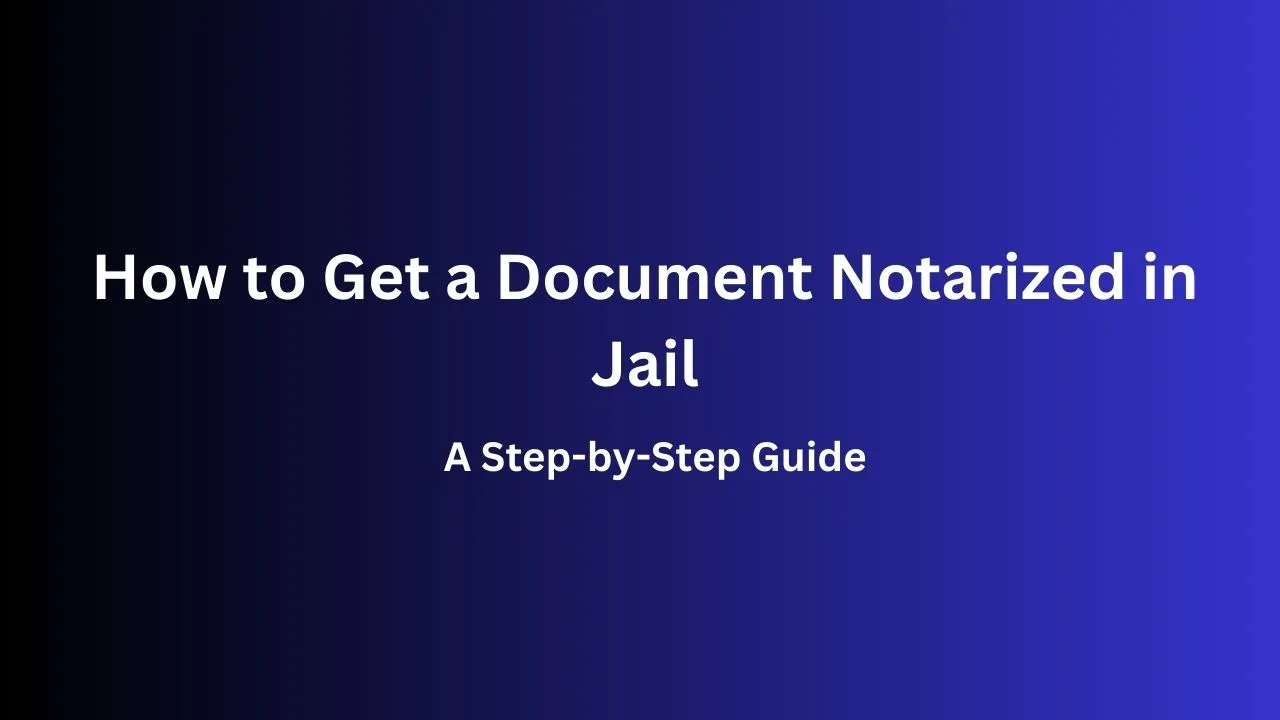People should not be prevented from carrying out their legal obligations or obtaining necessary services because they are incarcerated. The notarization of important documents is one such service that verifies their authenticity and integrity. The goal of this article is to offer a thorough how-to for notarizing documents while incarcerated. Understanding the procedure and specifications for obtaining a notarized document is essential whether you or someone you know is in jail already or is about to go to jail. In this article I am going to tell you How to Get a Document Notarized in Jail so let’s know
1. Understanding Notarization in the Context of Incarceration
Incarcerated individuals often require notarized documents for various purposes, such as legal matters, property transactions, or official correspondence. Notarization involves having a qualified notary public witness the signing of a document and confirming the signer’s identity. However, the process can be different when it comes to obtaining notarization while in jail.
2. Identifying the Document Requiring Notarization
Before proceeding with the notarization process, it is essential to identify the specific document that needs to be notarized. This could be a power of attorney, an affidavit, a will, or any other legal document requiring authentication.
3. Researching Applicable Laws and Regulations
Different jurisdictions may have specific rules and regulations governing notarization in jails. It is crucial to research and familiarize yourself with the relevant laws to ensure compliance throughout the process.
4. Contacting the Facility Notary or Administration
Most correctional facilities have a designated notary public or a process in place for document notarization. Contacting the facility’s notary or administration will provide you with the necessary information and guidance on the procedures involved.
5. Gathering Required Documentation
To proceed with notarization, gather all the required documentation related to the document needing notarization. This may include the original document, identification documents, and any supporting materials necessary for the notary’s verification.
6. Scheduling a Notary Visit
Once you have gathered the necessary documentation, schedule a visit with the facility notary. Some facilities may require prior appointments, so make sure to follow the established protocols to ensure a smooth process.
7. Preparing for the Notarization Appointment
Before the notary visit, prepare yourself by reviewing the document thoroughly. Ensure that all required fields are completed, and any necessary signatures are in place. Also, make sure to have any witnesses present if required by the jurisdiction.
8. Conducting the Notarization Process
During the notarization appointment, the notary public will verify your identity and witness the signing of the document. They may also administer an oath or affirmation, depending on the jurisdiction’s requirements. Follow the notary’s instructions carefully and provide accurate information as needed.
9. Retaining a Copy of the Notarized Document
After the notarization process is complete, it is important to retain a copy of the notarized document for your records. This copy can serve as proof of the document’s authenticity and can be useful for future reference.
10. Understanding Limitations and Considerations
While it is possible to get a document notarized in jail, certain limitations and considerations may apply. These can include restrictions on the types of documents that can be notarized, additional security measures, and specific protocols set by the correctional facility. It is important to be aware of these limitations to ensure a successful notarization process.
11. Seeking Legal Advice or Assistance
If you have any legal concerns or questions regarding the notarization process, it is advisable to seek legal advice or assistance. A qualified attorney can provide guidance tailored to your specific situation and help ensure that your rights are protected.
12. Alternative Options for Notarization
In some cases, if obtaining a traditional notarization in jail is not feasible, alternative options may be available. These can include remote online notarization services or the use of mobile notaries who can visit the facility upon approval. Explore these alternatives if they are permitted and suitable for your situation.
13. Documenting and Storing Notarized Documents
After obtaining a notarized document, it is crucial to handle it with care. Store it in a safe and secure place to prevent loss or damage. It is also recommended to make additional copies and store them separately for added protection.
14. Benefits of Notarized Documents in Jail
Having notarized documents while in jail can provide several benefits. They can be used as evidence in legal proceedings, ensure compliance with legal requirements, and facilitate official transactions. Notarized documents carry a higher level of credibility and can help establish trust in various situations.
Conclusion
In the article I have told you How to Get a Document Notarized in Jail While it might involve some extra steps and considerations, getting a document notarized while incarcerated is still entirely feasible. Even while incarcerated, people can complete their notarization requirements if they understand the process, follow the correct steps, and ask for assistance when necessary.
FAQs
Can I get any document notarized in jail?
While it depends on the specific jurisdiction and facility, there may be limitations on the types of documents that can be notarized in jail. It is essential to check with the facility’s notary or administration to determine the applicable guidelines.
Are notarized documents in jail admissible in court?
Notarized documents generally carry a higher level of credibility and can be used as evidence in legal proceedings. However, it is important to consult with an attorney to understand the specific requirements and admissibility in your jurisdiction.
